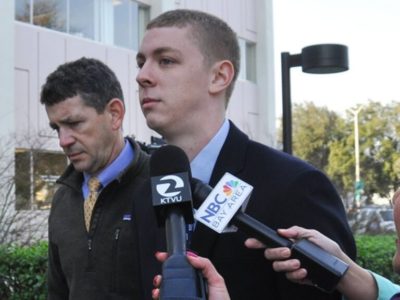I refuse to believe that anyone made it through the summer without hearing about the Brock Turner case. Now that he’s released, a whole new slew of media coverage about the case has emerged. People feel outraged. His sentence was unforgivably light for sexual assault. The judge even claimed a harsher sentence would have a “severe impact” on him. Never mind the severe impact his crime has on the victim, and will likely continue for the rest of her life.
Newspapers printed his swim times and talked about how his future looked so bright. They painted a picture of a young man who could not possibly rape someone. This is not a new phenomenon. In fact, this spinning of accused athlete’s stories is infuriatingly old news. The question then becomes: why?
We look to athletes as heroes. In the beginning of August, Olympic coverage stressed the sacrifices of athletes who worked their entire lives to become the best, to achieve glory. In and of itself, no problem exists with this narrative.
Athletes do work hard, an attribute that we should both admire and aspire to follow. However, when our admiration falls like a veil over a person, we allow them the freedom that comes with believing a person can do no wrong. “You get behind them and you root for them and they do well, and then they do these horrific things and it becomes difficult to reconcile how you see them and what they’ve done,” said Debra Weiss, a licensed mental health advocate with the University of Florida.
When we get so wrapped up in the successes and failures of these athletes, we feel like we know them. We become connected, often defensive even when they’ve done something heinous. After all, how can such a hardworking athlete do something so horrible?
Why is all of this important? “Where I think it really intersects with rape culture is power. With a case involving local celebrity, what happens with the survivor is this feeling of, ‘No one will believe me. This person has power.’ And with that power comes fear of retaliation,” said Weiss. This is not to say that every athlete is inherently dangerous or ill-natured. Instead, it means that those who become perpetrators are much less likely to face consequences, either because of an unwillingness to prosecute or a fear of reporting.
Imagine how difficult it must feel to muster the courage to report a rape regardless of the identity of the perpetrator. Now imagine that people across campus, not to mention the nation, both love and worship your rapist. By challenging the public perception of a beloved athlete with the truth of your experience, you open yourself up to public scrutiny and intense media coverage of a horrific event you would probably rather keep private. This only adds to the multitude of rape cases that go unreported.
However trivial it feels, the one upside in cases like Turner’s is that the media attention starts a long overdue conversation. Unfortunately, we as humans sometimes need to see a horrible thing happen before we acknowledge that horrible things occur. “The horrible thing that’s happening, the thing that’s brought to attention, will hopefully spark outrage,” said Weiss. And we can’t start to change anything until we acknowledge the truth of something as horrific as rape culture.
So what can we do? We can stop rallying around people simply because they look good in the light of day. People often reveal their true colors when no one’s looking. With all of these high-profile cases in the past few years, we as a public have shown a gross unwillingness to accept the testimony of victims simply because they contradict the image we hold of people we don’t really know.
Victim blaming is wrong, but victim silencing is worse. We live in a world where victims feel afraid to report. The victims who do report often get driven off their campus after being vilified for likely the worst thing that will ever happen to them. In a world like this, we must ask ourselves: How can we be better?



















